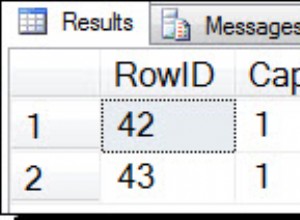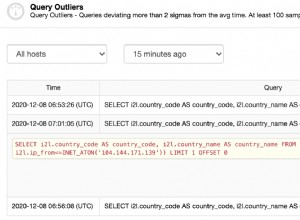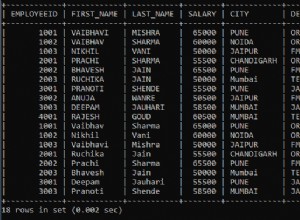Etablir une connexion
Tout d'abord, vous devez remplacer votre mysqli connexion avec un PDO un (ou au moins ajouter le PDO connexion à côté de mysqli un !).
// Define database connection parameters
$db_host = "127.0.0.1";
$db_name = "name_of_database";
$db_user = "user_name";
$db_pass = "user_password";
// Create a connection to the MySQL database using PDO
$pdo = new pdo(
"mysql:host={$db_host};dbname={$db_name}",
$db_user,
$db_pass,
[
PDO::ATTR_ERRMODE => PDO::ERRMODE_EXCEPTION,
PDO::ATTR_EMULATE_PREPARES => FALSE
]
);
Mise à jour de votre code
Déclarations préparées avec mysqli et PDO
Il est presque toujours préférable d'utiliser des instructions préparées lors de l'insertion de données variables dans une requête SQL. Non seulement il est plus sûr (si les données proviennent de n'importe quel type d'entrée générée par l'utilisateur), mais il est également plus facile à lire et plus facile à exécuter plusieurs fois avec des valeurs différentes.
Requête préparée avec mysqli :
$sql = "SELECT column1, column2 FROM table WHERE column3 = ? AND column4 = ?";
$query = $mysqli->prepare($sql);
$query->bind_param("si", $string_condition, $int_condition);
$query->execute();
$query->store_result();
$query->bind_result($column1, $column2);
$query->fetch();
echo "Column1: {$column1}<br>";
echo "Column2: {$column2}";
Requête préparée avec PDO :
$sql = "SELECT column1, column2 FROM table WHERE column3 = ? AND column4 = ?";
$query = $pdo->prepare($sql);
$query->execute([$string_condition, $int_condition]);
$row = $query->fetchObject();
# $row = $query->fetch(); // Alternative to get indexed and/or associative array
echo "Column1: {$row->column1}<br>";
echo "Column2: {$row->column2}";
Code mis à jour
// Using the NULL coalescing operator here is shorter than a ternary
$id = $_SESSION['u_id'] ?? NULL;
if($id) {
$sql = "SELECT email FROM users WHERE u_id = ?";
$query = $pdo->prepare($sql); // Prepare the query
$query->execute([$id]); // Bind the parameter and execute the query
$email = $query->fetchColumn(); // Return the value from the database
}
// Putting "$email" on a line by itself does nothing for your code. The only
// thing it does is generate a "Notice" if it hasn't been defined earlier in
// the code. Best use:
// - The ternary operator: $email = (isset($email)) ? $email : "";
// - The NULL coalescing operator: $email = $email ?? "";
// - OR initialize it earlier in code, before the first `if`, like: $email = "";
// N.B. Instead of "" you could use NULL or FALSE as well. Basically in this case
// anything that equates to BOOL(FALSE); so we can use them in `if` statements
// so the following (2 commented lines and 1 uncommented) are effectively
// interchangeable.
$email = $email ?? "";
# $email = $email ?? FALSE;
# $email = $email ?? NULL;
// Presumably you will also want to change this function to PDO and prepared statements?
// Although it doesn't actually do anything in the code provided?
$suggestions = selectAll($table);
// Same as with email, we're just going to use the NULL coalescing operator.
// Note: in this case you had used the third option from above - I've just
// changed it so there is less bloat.
$optionOne = $_POST['optionOne'] ?? "";
$optionTwo = $_POST['optionTwo'] ?? "";
$newSuggestion = $_POST['new-suggestion'] ?? "";
// There's no point nesting `if` statements like this when there doesn't appear to be any
// additional code executed based on the out come of each statement? Just put it into one.
// We now don't need to use empty etc. because an empty, false, or null string all.
// equate to FALSE.
if($newSuggestion && $id && $email && $optionOne && $optionTwo) {
// Not sure why you've made the the table name a variable UNLESS you have multiple tables
// with exactly the same columns etc. and need to place in different ones at different
// times. Which seems unlikely so I've just put the table name inline.
$sql = "INSERT INTO suggestions (user_id, email, option_1, option_2) VALUES (?, ?, ?, ?)";
$query = $pdo->prepare($sql);
$query->execute([$id, $email, $optionOne, $optionTwo]);
}
else{
echo "All options must be entered";
}
Sans commentaires
$id = $_SESSION['u_id'] ?? NULL;
if($id) {
$sql = "SELECT email FROM users WHERE u_id = ?";
$query = $pdo->prepare($sql);
$query->execute([$id]);
$email = $query->fetchColumn();
}
$email = $email ?? "";
$suggestions = selectAll($table);
$optionOne = $_POST['optionOne'] ?? "";
$optionTwo = $_POST['optionTwo'] ?? "";
$newSuggestion = $_POST['new-suggestion'] ?? "";
if($newSuggestion && $id && $email && $optionOne && $optionTwo) {
$sql = "INSERT INTO suggestions (user_id, email, option_1, option_2) VALUES (?, ?, ?, ?)";
$query = $pdo->prepare($sql);
$query->execute([$id, $email, $optionOne, $optionTwo]);
}
else{
echo "All options must be entered";
}




